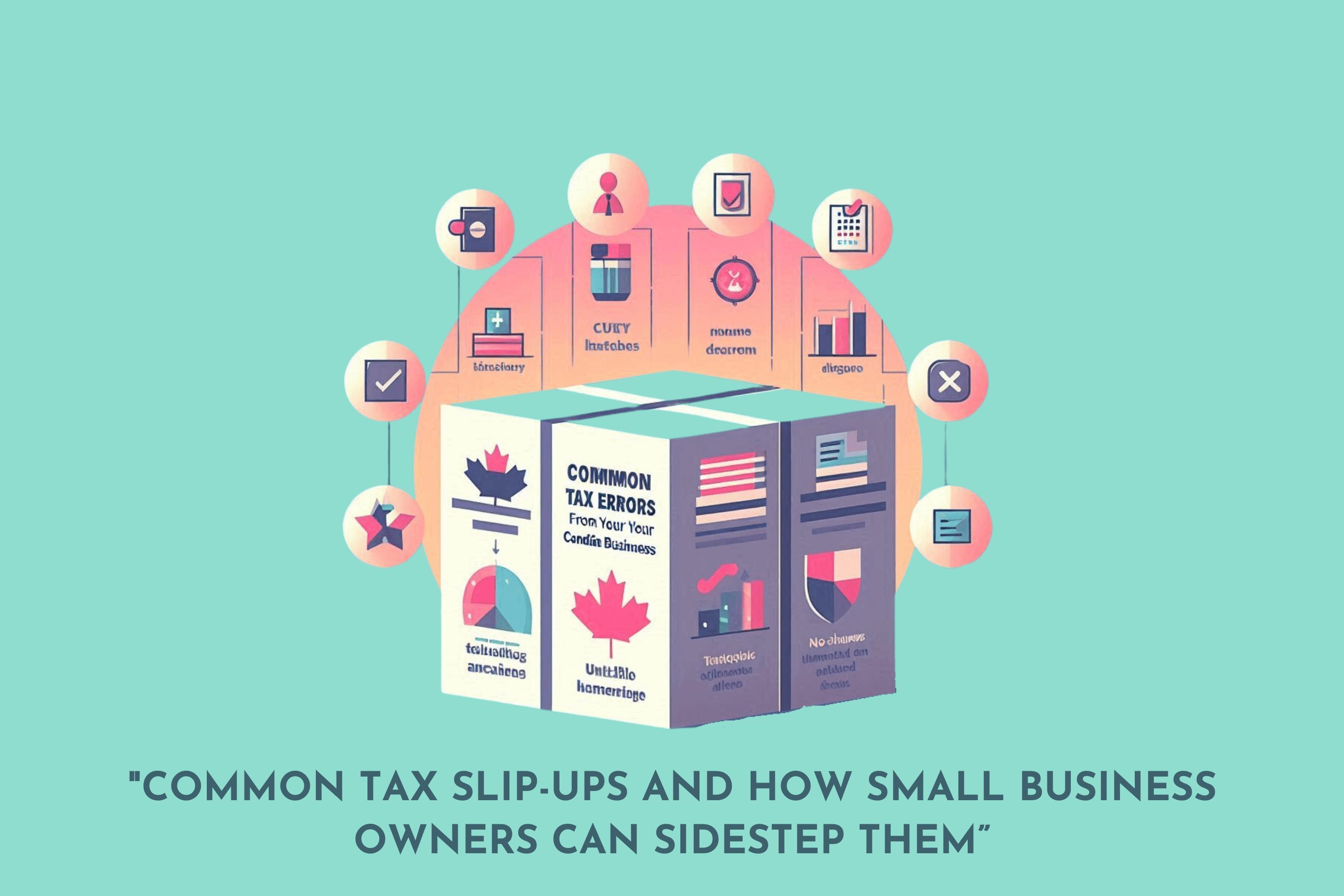
"Common Tax Slip-Ups and How Small Business Owners Can Sidestep Them”
Introduction
For every small
business owner, effective monetary management is key to success.
In this blog, Here, we
will understand tax filing problems and offer helpful advice to help you in
avoiding complications of tax filing.
Key
Takeaways:
Here are the essential
points to remember:
|
Mistake |
How to Avoid It |
|
1. Improper Bookkeeping |
Maintain organized financial records using
accounting software. Split out personal and business finances. Seek
professional assistance when needed. |
|
2. Penalties |
Stay informed about filing deadlines. Avoid
penalties by submitting your tax returns on time. |
|
3. The Shoebox Technique |
Organize receipts and documents systematically.
Avoid the chaos of disorganized records. |
|
4. Lacking knowledge of Tax Regulations |
Regularly update yourself on tax laws. Consult
experts to ensure compliance. |
|
5. Mixing Personal and Business Expenses |
Clearly distinguish between personal and business
transactions. Mixing them up can lead to confusion. |
|
Accurately estimate your income and set aside funds
for quarterly tax payments. |
|
|
7. Deductions |
Research deductible expenses and maximize your tax
benefits. |
|
8. Irregular Worker Classification |
Understand the difference between employees and
contractors. Misclassification can result in penalties. |
Let
Us discuss common problems and solutions for small businesses:
1.
Improper Bookkeeping
Everyone should
maintain an organized record of their finance is essential for correct
reporting and tax management. Points to help you avoid mistakes:
- ·
Accounting
Software: Invest in reliable accounting software to track
income, expenses, and cash flow.
- ·
Separate
Personal and Business Finances: Keep separate bank accounts for personal and
business transactions.
- ·
Seek
Professional Help: Consider hiring an accountant or bookkeeper if
bookkeeping is difficult.
2.
Penalties
Small Business owners
could face consequences for late tax filing. They could be charged extra for
interest.
Steps to help you avoid
penalties:
- ·
Mark
Important Dates: Use a calendar or digital reminders for tax filing
deadlines.
- ·
Submit
Returns on Time: Avoid penalties by filing your tax returns
promptly.
- ·
Stay
Informed: Be aware of any changes in tax regulations that
might affect deadlines.
3.
The Shoebox Technique
The “shoebox” method where receipts pile up in
a shoebox is an old-world famous method of disaster. So, please consider
digital solutions for better efficiency.
Points to avoid the
“shoebox” attitude:
- ·
Digitalize
Receipts: Scan or photograph receipts and store them
electronically.
- ·
Categorize
Expenses: Create folders for different expenses (e.g.,
office supplies, travel, utilities).
- ·
Regular
Maintenance: Set a time to organize and file receipts every
week.
4.
Lacking knowledge of Tax Regulations
Tax laws change often.
Regularly check for updates and consult tax professionals. Being aware of
changes helps you avoid surprises during tax season.
Consider these
strategies:
- ·
Subscribe
to Updates: Follow official government websites or tax news
sources.
- ·
Consult
Experts: Get advice from tax professionals or attend
workshops.
- ·
Review
Annually: Devote time to review changes in tax
regulations annually.
5.
Mixing Personal and Business Expenses
Mixing personal and
business expenses can lead to errors. The financial health of your business
depends on accurate records.
Avoid mixing personal
and business finances:
- ·
Use
Separate Accounts: Keep separate bank accounts and credit cards.
- ·
Label
Transactions Clearly: Show evidently whether expenses are personal or
business-related.
6.
Under Estimating Tax Payments
Small business owners
often pay quarterly taxes. Estimate your income accurately to avoid
underpayment penalties. Set aside funds for these regular payments.
Follow these steps:
- ·
Accurate
Income Estimation: Estimate your income realistically to calculate
the correct tax amount.
- ·
Set
Aside Funds: Regularly distribute funds for quarterly tax
payments.
7.
Deductions
Research for eligible
deductions specific to your industry. You can consult an accountant to improve
tax benefits.
- ·
Research
Deductible Expenses: Understand which expenses qualify for
deductions (e.g., office rent, office supplies, travel expenses, marketing
costs, marketing costs).
- ·
Consult
Professionals: Accountants can guide you on maximizing
deductions.
8.
Irregular Worker Classification
Know the difference
between employees and contractors. Misclassifying the workers can drag you into
legal issues. Learn more about the criteria for the workers’ category.
Classify workers
correctly to avoid penalties:
- ·
Know
the Difference: Understand the distinction between employees
and contractors.
- ·
Review
Contracts: Ensure contracts accurately reflect the
worker’s status.
- ·
Seek
Legal Advice: Consult an employment lawyer if needed.
These approaches will help you manage tax season more skillfully and maintain the financial stability of your company. Assure that your partners in the world of taxes are getting expert advice and keeping correct records.
ASAN Can Help
Empower your financial future with ASAN's expert guidance on Canadian & US Taxation. We strive to align investments with your goals for true financial freedom.
Ready to take the next step?
Contact Us
📞 Phone: +1(613)-981-7097
🌐 Website: asangroupinc.com
Disclaimer:
The information provided in this blog is intended for general guidance and informational purposes only and should not be considered as professional accounting, audit, or assurance advice. Please consult with a certified professional for specific advice tailored to your situation.

